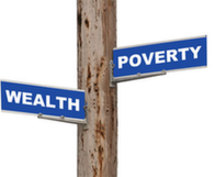经济合作与发展组织(OECD)周二发表报告称,贫富差距在大多数发达国家中有所扩大,但扩大的速度并没有人们想象的那么快,并不足以引起社会动乱。该报告称,政府通过提高税收,增加福利开支,缓解了贫富差距。另据此报告提供的最新数据显示,丹麦是世界上贫富差距最小的国家,瑞典紧随其后。而贫富差距最大的国家是墨西哥,土耳其次之。

|

The gap between the rich and poor has grown in most wealthy nations, but not as quickly as many people believe and not enough to raise fears of social upheaval
|
|
|
The gap between the rich and poor has grown in most wealthy nations, but not as quickly as many people believe and not enough to raise fears of social upheaval, the OECD said in a report released yesterday.
The 30-nation Organization for Economic Co-operation and Development said governments were off-setting widening disparities by increasing taxes and boosting welfare spending.
According to latest data, the OECD said Denmark had the lowest inequality ratings, just in front of Sweden, while Mexico had the worst ratings, followed by Turkey.
"The increase in inequality, though widespread and significant, has not been as spectacular as most people probably think it has been," the 309-page report said.
"This difference between what the data shows and what people think no doubt partly reflects the so-called 'Hello magazine effect'," it added, saying that people read widely about the super rich and imagined many people lived the life of luxury.
Across the 24 OECD nations for which data was available, the cumulative increase in inequality was around 7 percent from the mid-1980s to mid-2000s, with most of the rise accounted for in the first decade.
It said this expansion was "not one that would justify talk about the breakdown of society."
However, the Paris-based group said government intervention had helped temper the increase in inequality.
"In developed countries, governments have been taxing more and spending more to offset the trend towards more inequality. They now spend more on social policies than at any time in history," it said.
Older people had benefitted the most from this redistribution of wealth, with those in the 55-75 age bracket seeing the biggest increases in incomes over the past 20 years, and pensioner poverty falling rapidly in many places.
By contrast, child poverty had increased, and is now above average for the population as a whole.
"This is despite mounting evidence that child wellbeing is a key determinant of how well someone will do as an adult, how much they will earn, how healthy they will be," the OECD said.
The report said income inequality in general had risen significantly since 2000 in countries such as Canada, Germany, Norway, the United States and Italy.
(Agencies)

(英语点津 Helen 编辑)